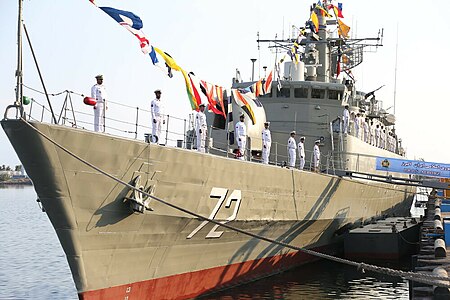The Iranian warship Alborz has entered the Red Sea, amid escalating tension in the strategic waterway, Iranian media reported on Monday
The ship navigated through Bab el-Mandeb, a crucial sea-route separating the Arabian Peninsula from Africa, Iran's Tasnim news agency reported. The reason for this deployment was not clarified.
Iranian vessels have been stationed in the region since 2009. Their primary duties are to safeguard navigation routes and combat piracy.
The Houthi rebel group in Yemen has escalated its attacks in the Red Sea since the onset of the war between Israel and Hamas on 7 October. The Houthis control a significant portion of Yemen and reportedly have close ties to Iran. They target ships deemed ‘linked to Israel,’ in support of the Palestinians in the Gaza Strip in the Israel-Hamas war, and have also fired missiles and drones against Israel.
However, Iran denies supplying the rebels with military equipment, despite allegations of its involvement in the attacks.
The United States and a number of other countries maintain a coalition patrol in the area. Their objective is to protect maritime traffic from Houthi attacks.
On Sunday, the US military reported sinking three rebel ships following attacks on a Danish container vessel, Maersk. The rebels’ spokesperson claimed ten of their group were killed in the strike.
British Foreign Secretary David Cameron spoke on Sunday with his Iranian counterpart, Hossein Amir-Abdolahian, about the Houthi attacks. He expressed concern over the threat to innocent lives and the global economy, and stressed Iran's responsibility for preventing the attacks.
"I spoke to Amir-Abdolahian today about Houthi attacks in the Red Sea, which threaten innocent lives and the global economy," Cameron posted on X (formerly Twitter) on Sunday. "I made clear that Iran shares responsibility for preventing these attacks given their long-standing support to the Houthis."
The Houthis, an Arab tribe believing in a special form of Shia Islam, rule northern Yemen after a multi-year long civil war and Saudi Arabia interference. During the war the Houthis were supported by Iran. The war ended with a truce in 2022 and devastated the country, leaving hundreds of thousands of people killed and dead by famine.
With 80 per cent of the population in need of humanitarian aid and protection, the UN has described the current situation in Yemen as the largest humanitarian crisis in the world.

